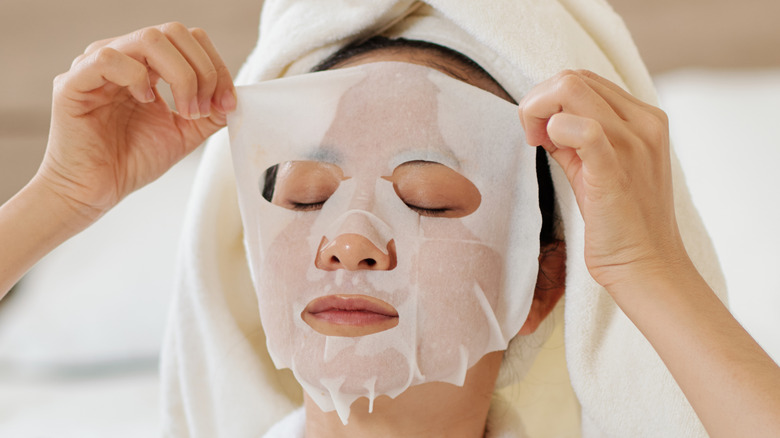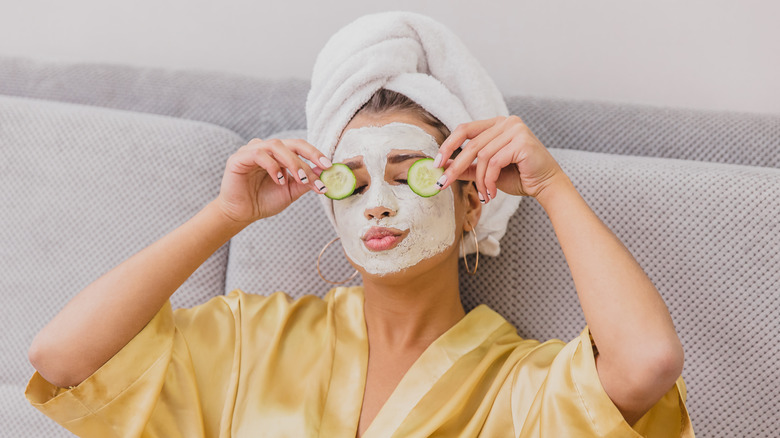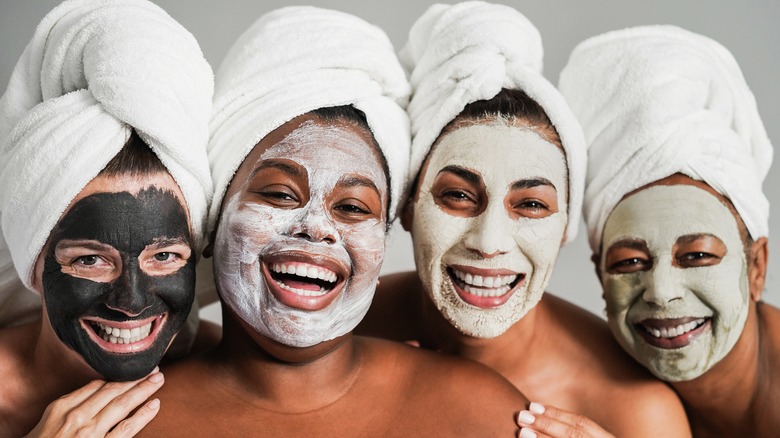What Happens When You Go Overboard With Skincare Masks?
It's Friday night, you're in your pajamas, and you're all set to relax on your comfy couch and browse Netflix for a binge-worthy show. Out of the corner of your eye, you see a Sephora bag and remember that you bought a bunch of face masks for just such a night. Should you use a nourishing mask or a pore cleaner? The options are limitless, and it seems safe to say that a good face mask is a universal beauty ritual.
There's a certain zen to be found in applying a mask all over your face, waiting for it to dry, and then peeling it off to reveal the mask's purportedly miraculous effects. It's a self-care routine that many can relate to, and because the beauty industry is saturated with all kinds of masks for whatever ails your skin, it's become a regular ritual. But what if you go too far in your quest to unclog your pores? Is it possible to harm your skin by overusing masks? The answer is "yes," and we're going to find out why.
Yes, over-masking is a real thing
As it turns out, over-masking, which means using skincare masks too often, can damage your skin barrier, according to dermatologist Dr. Jessie Cheung (via Byrdie). Per Dr. Jessie Cheung, it's time to dial back on the masking if your skin is showing signs of irritation like dryness, itchiness, or flakiness. That being said, before you throw out all of your unused masks, take a look at the ingredients.
"Rather than looking at the type of the mask (hydrogel, sheet, peel-off), it's more about the actual ingredients," dermatologist Dr. Hadley King told Byrdie. "Masks formulated to be hydrating, soothing, or moisturizing can be used more frequently than masks formulated to be exfoliating or drying." So, what type of ingredients should you be looking for in the first place? Dermatologist Dr. Nikhil Dhingra told Healthline that the "ingredients should suit your skin type and ideally address a specific concern."
In other words, before slapping a mask on your face, read what it contains, and remember that moderation is always key in life.
Don't fret, face mask fans!
Skin expert Dr. Parisha Acharya warns that over-masking can cause a variety of unpleasant side effects. "As much as we think we are giving ourselves a pampering session, overuse can result in harm and lead to sensitivity," Dr. Acharya explains to Refinery29. "You can also strip the skin of its protective oils and friendly bacteria which are essential for maintaining healthy function of your skin."
It's not all bad news, face mask devotees. There is a safe way to keep applying beloved skincare masks, so you're not limited to the occasional pampering session. Dr. Acharya suggests "multi-masking," the practice of putting on many face masks at once to address multiple skin issues. If you have blackheads, apply a salicylic acid mask to your nose, chin, or any other areas pesky blackheads typically pop up. If your cheeks and forehead need some TLC, try a hyaluronic acid and glycerin mask to add some moisture and give you an effortless glow.
What you put on your face after a mask is as crucial as the mask itself. Dr. Jessie Cheung recommends using an occlusive moisturizer post-masking to make sure that you don't lose any of the goodness you received from the mask (Byrdie). Meanwhile, Dr. Hadley King told Byrdie, "Oily skin that's just done a clay-based mask should opt for a light gel moisturizer or a hyaluronic acid serum." Have you been treating your face with a chemical exfoliant? Sunscreen should be applied after masking to prevent sunburn (and FYI, sunscreen should be applied regardless of whether or not you use skincare masks).


